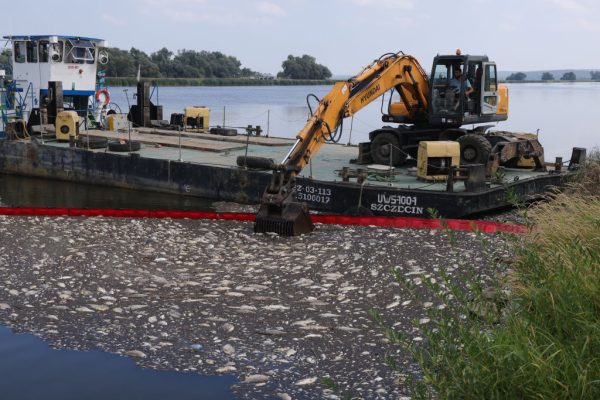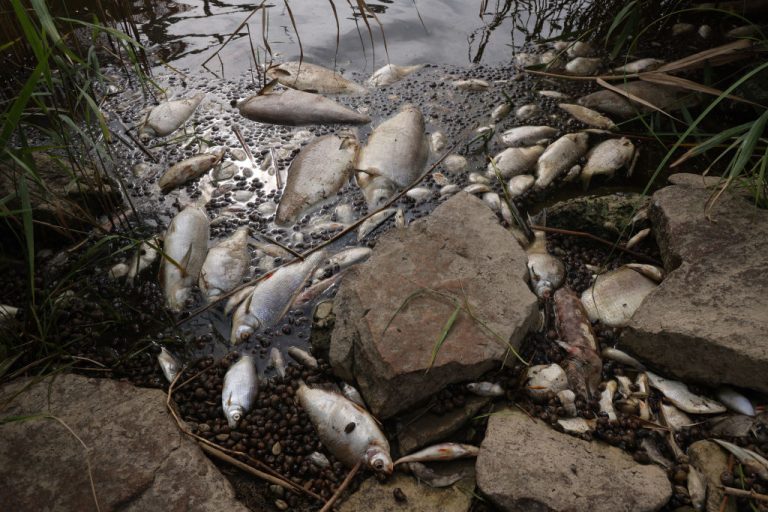Since last month, thousands of dead fish have been found in the Oder river in Poland, covering portions of the 850-kilometer-long river in dead fish and shellfish. The cause of the mass deaths is currently unknown, but authorities from both Germany and Poland are exerting significant efforts to find the source of the suspected contamination.
At the end of July, Polish anglers reported disposing of tons of dead fish from the river near the town of Olawa, around 300 kilometers north of the current die-off.
The former head of Poland’s national water management authority, Przemyslaw Daca — who was fired for not reacting to the situation early enough — said that the country had picked up 11 tons of dead fish by Thursday evening , Aug. 11.
“The problem is enormous, the wave of pollution runs from Wroclaw to Szczecin,” Daca told Polish Radio 24. “Those are hundreds of kilometers of river, the pollution is gigantic.”
“An environmental catastrophe is in the offing,” German Environment Minister Steffi Lemke told the RND newspaper group. “All sides are working flat out to find the reasons for this mass die-out and minimize potential further damage.”
Success
You are now signed up for our newsletter
Success
Check your email to complete sign up
The Oder river stretches from the Czech Republic to the border between Germany and Poland and is connected to the Baltic Sea. The river has previously been renowned as a “clean river” and is the habitat for around 40 species of freshwater fish.
A German official from the state of Brandenburg said that test results conducted showed heightened levels of oxygen in the water, suggesting that a foreign substance is at play.
“As of today, none of these (water) tests have confirmed the presence of toxic substances,” the Polish minister of climate and environment, Anna Moskwa, said after meeting with Lemke.
The Polish-based Lower Silesia Water Authority initially reported that a toxic substance — most likely, mesitylene — was found in two locations on the Oder, but subsequent tests have detected no trace of the chemical.
It was also initially reported by German news broadcaster Rundfunk Berlin-Brandenburg (RBB) that mercury was found in the water, but subsequent tests once again showed no sign of mercury or any other heavy metals.
“We have completed fish tests for mercury and heavy metals. Neither mercury nor heavy metals were found in the collected samples,” Moskwa said.
Moskwa added that samples are now being analyzed for any pesticides and more than 300 other substances.

Moskwa said, “We still do not exclude a variant of the toxic substances… so we are interested in the prompt identification of the perpetrator… We are checking entities which run business and industrial activity along the river,” Reuters reported.
Moskwa added that on Aug. 13 river samples analyzed in both Poland and Germany showed above normal levels of salt in the water
According to German-owned news broadcaster Deutsche Welle (DW), Christan Wolter, researcher at the Leibniz Institute of Freshwater Ecology and Inland Fisheries, believes that “ongoing dredging” to increase water levels of the Oder could release mercury, which can be found in the sediment of the river.
However, he also added that lowered water levels since 2018 and higher water temperatures at around 25°C — presumably due to the heatwave striking Europe — may also be responsible for the deaths of the fish.
“With low water levels you get a higher concentration of [oxygen consuming] salt and organic material,” Wolter told DW, adding that discharges of wastewater into the Oder may have added to the degradation.
READ MORE:
- Rhine River Just 1.5 Feet Deep in Some Areas as Heatwave Scours Europe
- Chinese Paddlefish and Wild Yangtze Sturgeon Now Extinct: IUCN
- New NASA Images Reveal the Slow Death of Lake Mead, Which Nourishes 60 Percent of US Agriculture
- Amid Record Heatwave, Europe Discovers Solar Panels Inefficient in High Temperatures
- European Wildfires Are Detonating Unexploded 100-year-old Shells Fired in WWI
Governmental woes
Environmental activists and opposition politicians have lambasted the Polish government for being unable to address the situation and for failing to warn citizens not to bathe or fish in the river.
Germany also shared its dissatisfaction with the lack of action, with Brandenburg environment minister Axel Vogel saying that “chains of communication between the Polish and German sides did not work in this case.”
Polish Prime Minister Mateusz Morawiecki said that it would take years to restore the river to its normal state.
“The scale of this pollution is very big. So big that the Oder may take years to return to a fairly normal state,” Morawiecki said in a podcast on Aug. 13.
“It is likely that enormous amounts of chemical waste have been dumped into the river,” he added, promising retribution to those potentially responsible.
Poland’s interior minister has placed a reward of one million zlotys (US$220,000) for anyone who can identify the perpetrators of the pollution, al-Jazeera reported.
Along with Przemysław Daca, head of the general environmental inspectorate, Michal Mistrzak, the head of the Environmental Protection Inspectorate, a Polish politician who was responsible for amending Polish law to combat environmental crime, was also fired for not responding to the crisis earlier.













